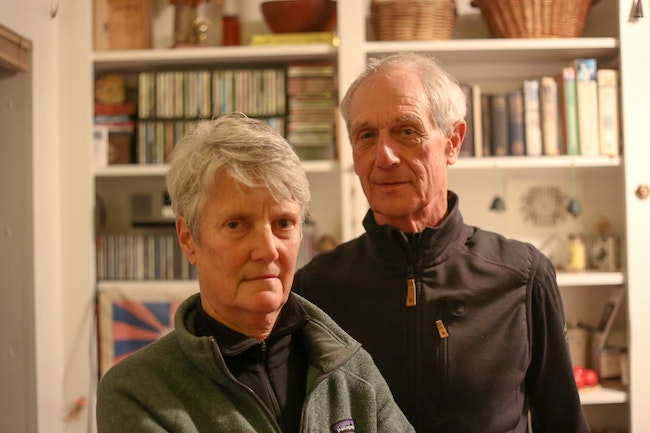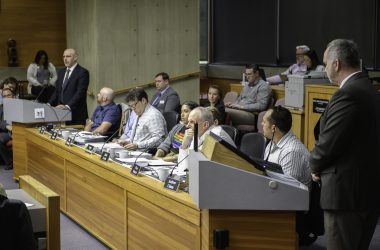 Sarah Owens and Michael Livingston stand in their apartment on a recent evening. The two author a blog that has made them one of the most vocal opponents to Salem’s proposed sit-lie ordinance. (Troy Brynelson/Salem Reporter)
Sarah Owens and Michael Livingston stand in their apartment on a recent evening. The two author a blog that has made them one of the most vocal opponents to Salem’s proposed sit-lie ordinance. (Troy Brynelson/Salem Reporter)
On a Friday morning in September, the energy drained from Loucks Auditorium at City Hall as it did Sarah Owens.
The retired attorney —glasses resting on her nose, laptop and camera in hand — had just watched what amounted to an open mic for people to rant about homelessness.
Comments revolved around a proposal to ban sitting or lying on sidewalks to curb behaviors purportedly disrupting downtown businesses. The city of Salem has been considering the idea since July and hosted three public forums.
While the proposal has been Salem’s marquee issue for months now, Owens and her partner, Michael Livingston, have filled the role of public critic. They have seemingly made it their day job to oppose the proposal, known informally as “sit-lie.” They have become familiar to people in City Hall and elsewhere, engaging on homelessness and other civic issues out of a sense of duty.
Now, they both worry the ban will lead to more discrimination against homeless residents.
From their blog, called the CANDO blog, they volley questions and criticisms at an almost daily rate and unearth public records. They’ve attracted an audience that includes public officials. They’ve also landed accusations they play fast and loose with the truth.
It was late October when they wrote Councilor Cara Kaser didn’t “see the need” for a work session on the ordinance, which prompted the councilor to demand a correction.
“I assume that you want your blog posts to (be) perceived as based on facts and not conjectures,” Kaser emailed Owens on Oct. 23.
But they also have a knack for pushing the public conversation forward. Days later, the blog used a public records request to publish a draft of the city’s official staff report on the ordinance, which they promptly published.
“They’re people who are very engaged and very vocal,” Kaser told Salem Reporter. “There are times when you agree with their viewpoints and sometimes you don’t.”
But why do they devote themselves to the issue? The couple says they just want the facts to be out there.
“It’s important that people have a common factual basis,” Owens said. “If we don’t have that, we can’t have a conversation – and we’re probably not going to make good decisions.”
At the forum at Loucks Auditorium, Owens said she hoped to see homeless residents raise their own facts that maybe supporters of sit-lie hadn’t considered. But that argument never appeared.
Supporters said the ban was a necessary tool, while opponents made vague demands for social services. One disgruntled man outright threatened violence.
Two hours later, a deflated Owens left.
She wondered: what did she expect? Some people can’t defend themselves. That’s why they need help to make their case, she thought.
“It’s kind of like people who are in the court system who fail to make their court dates, fail to complete forms and fail to meet their parole officers. If they made better decisions, they wouldn’t be where they were,” she said. “That’s the nature of the problem.”
“A worthy adversary.”
The work on the blog happens from a seventh-floor apartment downtown. They often sit on the floor in their living room, watching public access programming on a television barely off the ground.
An early draft of a blog, they joke, probably starts as an argument between them. They say they keep each other sharp.
“Some people want a soulmate. We want a worthy adversary,” Owens said, laughing. They both speak with a southern lilt from upbringings in North Carolina. They are also both tall, lean and gray-haired.
Owens and Livingston met in 1975, but didn’t get together until about 15 years ago. They “stayed in touch, like Christmas cards once a year,” Owens said, “but we’d always been married to somebody else.”
Neither had pursued legal careers right away. Owens studied dance at New York University, and then started a family before studying law as a more “marketable” skill, she said. Livingston taught and worked as a carpenter until he joined a movement against a proposed nuclear reactor and learned the value of lawyers.
“I found out pretty quickly you could accomplish more in that area than in grassroots (protests),” he said. “I think that was, for me, a wise decision.”
They united in 2004 when Owens, newly divorced, moved to Oregon.
Livingston’s career landed him as an attorney at the Oregon Department of Justice and then as a pro tem judge. Owens then traded private practice to become a lawyer for the state Employment Department.
Then they both retired in 2013 with a loose plan to stay involved in the community.
“We spent about a year before that thinking about what we might want to do,” Livingston recalled. “We wanted to do things we were interested in, that had some component of public good, and that were things we could do together.”
In late October, they pruned trees at a community garden in the Four Corners area and laid down cardboard to cover the beds for the winter. Vegetables grown there are donated to Marion Polk Food Share.
“A lot of people who are getting food from (the food share) don’t have a kitchen,” Owens said.
 Sarah Owens, right, and Michael Livingston work at a community garden in late October. (Troy Brynelson/Salem Reporter)
Sarah Owens, right, and Michael Livingston work at a community garden in late October. (Troy Brynelson/Salem Reporter)
Organizers say Owens and Livingston have for the last three years been the garden’s steady hand.
“They took over a garden that needed a lot of love,” said Amy Joens, who helps coordinate community gardens for Marion Polk Food Share. “It was really overgrown and there wasn’t a lot of participation from the community. Their role was just putting a lot of personal time into turning the garden around… and encourage more people to participate.”
Conversely, they had a hand last year in the federal government auditing a city of Salem commission, which ultimately unraveled. The couple both sat on the city’s Community Services and Housing Commission and questioned whether it was doing enough to safeguard against conflicts of interest. Following the audit, the city dismantled the commission.
Livingston said they had no agenda when they started asking those questions. He said the former lawyers were just asking if the commission was running as designed.
“We were just pointing out what the (commission’s) charter said,” Livingston said.
“The truth is like poetry. People hate poetry.”
Their penchant for asking hard questions sometimes leaves people feeling treated unfairly.
In October 2017, the couple wove three blog posts into an accusation that Jimmy Jones and the agency he heads, the Mid-Willamette Valley Community Action Agency, misspent $500,000 in state dollars.
The couple argued those funds were earmarked to open a homeless day shelter immediately. Instead, Jones’ agency spent the money as a down payment on a new office building that became The ARCHES Project. That building offers a day shelter, but it didn’t open for more than a year.
Owens and Livingston obtained emails between Jones and the state to pick Jones apart and implicate him in a “cruel, shameless lie.”
“Michael and Sarah, obviously they felt we should have spent that money on other things,” Jones recently told Salem Reporter.
Jones maintains today the state was well aware of his agency’s plans. But he said his agency and the state both made missteps in the process, which Owens and Livingston latched onto.
“There were a lot of i’s that weren’t dotted and a lot of t’s that weren’t crossed well,” he said. “We communicated with (the state) months before getting that building about what our intentions were.”
Either way, Owens and Livingston aired out their misgivings and still recall it when asked about times they’ve butted heads with others in the community.
“We wanted the funds to go for (shelter) for ending homelessness — not managing it, not buying a bunch of concrete that homeless people couldn’t hang out in,” Owens said
In Livingston’s and Owens’ minds, their posts were constructive criticism to the community’s benefit.
“The information is not meant to say ‘let’s go tear the building down.’ It’s quite the contrary,” Livingston said. “It’s to say let’s keep it going and keep it effective.”
Their style has brought them into confrontations more than once, they said, but it serves a purpose.
About a year ago, Livingston took his questions to a radio show he co-hosted and wound up fired. He and his co-host, Sara Cromwell, held an interview in absentia with Mayor Chuck Bennett after he stopped appearing on the show. Livingston asked pointed questions about the city’s funding for a sobering center and other homeless initiatives.
“Those are our questions for the mayor and as I said we’re going to continue on the (radio show) for the foreseeable future to have questions for Mayor Bennett,” Livingston said on the air.
It was the last straw for station managers who kicked them off the program and called them “not team players.” Livingston and Owens responded by developing a podcast they publish to their blog.
Bennett, meanwhile, said the couple’s inquiries are often helpful to the community.
“Sarah and Michael are really well-informed citizens who have shown a lot of interest in the homeless issue,” he said.
He understands why some are put off by them, he added, but said that elected officials particularly can’t let that bother them.
“I actually don’t have as strong opinions as are sometimes ascribed to me (in the blog),” Bennett said. “I try to be real open-minded about it, even if I don’t like the way I’m portrayed. But so what? I’m an elected person in Salem and I have a responsibility to pay close attention to what they’re thinking.”
That may be what Owens and Livingston are hoping to hear.
“There’s this great line in the movie ‘The Big Short,’” Livingston said. “The truth is like poetry. And people hate poetry.”
On Monday night, Owens and Livingston will be paying close attention as city council decides the fate of the sit-lie ordinance. Monday morning, the two were already drafting blog posts in anticipation of what the decision could be.
They expect to see a compromise. Councilors have said they would like to see some change to the ordinance to ensure homeless residents aren’t targeted.
The couple expects to watch the proceedings from their apartment floor, poised to weigh in with a voice they hope matters.
Have a tip? Contact reporter Troy Brynelson at 503-575-9930, [email protected] or @TroyWB.









